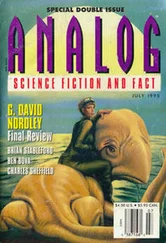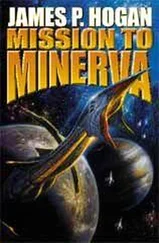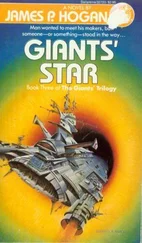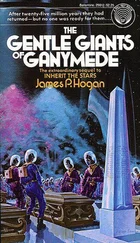James Hogan - Inherit the Stars
Здесь есть возможность читать онлайн «James Hogan - Inherit the Stars» весь текст электронной книги совершенно бесплатно (целиком полную версию без сокращений). В некоторых случаях можно слушать аудио, скачать через торрент в формате fb2 и присутствует краткое содержание. Жанр: Фантастика и фэнтези, на английском языке. Описание произведения, (предисловие) а так же отзывы посетителей доступны на портале библиотеки ЛибКат.
- Название:Inherit the Stars
- Автор:
- Жанр:
- Год:неизвестен
- ISBN:нет данных
- Рейтинг книги:3 / 5. Голосов: 1
-
Избранное:Добавить в избранное
- Отзывы:
-
Ваша оценка:
- 60
- 1
- 2
- 3
- 4
- 5
Inherit the Stars: краткое содержание, описание и аннотация
Предлагаем к чтению аннотацию, описание, краткое содержание или предисловие (зависит от того, что написал сам автор книги «Inherit the Stars»). Если вы не нашли необходимую информацию о книге — напишите в комментариях, мы постараемся отыскать её.
Inherit the Stars — читать онлайн бесплатно полную книгу (весь текст) целиком
Ниже представлен текст книги, разбитый по страницам. Система сохранения места последней прочитанной страницы, позволяет с удобством читать онлайн бесплатно книгу «Inherit the Stars», без необходимости каждый раз заново искать на чём Вы остановились. Поставьте закладку, и сможете в любой момент перейти на страницу, на которой закончили чтение.
Интервал:
Закладка:
"Now, for those of you who have not yet had the pleasure, allow me to introduce Cyril." The picture of Hunt vanished and a view of the man-ape retrieved from the Ganymean ship appeared.
Hunt’s voice carried on with the commentary: "Chris’s team has made a thorough examination of this character in the Jupiter Four laboraties. Chris’s own summary of their results was, quote:
"‘We consider this to be something nearer the direct line of descent toward modern man than anything previously studied. Many fossil finds have been made on Earth of creatures that represented various branches of development from the early progressive apes in the general direction of man. All finds to date, however, have been classed as belonging to offshoots from the main stream; a specimen of a direct link in the chain leading to Homo sapiens has always persistently eluded us. Here, we have such a link.’ Unquote." The image of Hunt reappeared. "We can be fairly sure, therefore, that among the terrestrial life forms left to develop on Minerva were numbers of primates as far advanced in their evolution as anything back on Earth.
"The faster evolution characteristic of Minerva thus far was repeated, possibly as a result of the harsher environment and climate. Millions of years passed. On Earth a succession of manlike beings came and went, some progressive, some degenerate. The Ice Age came and moved through into its final, glacial phase some fifty thousand years ago. By this time on Earth, primitive humanoids represented the apex of progress-crude cave dwellers, hunters, makers of simple weapons and tools chipped out of stone. But on Minerva, a new technological civilization already existed: the Lunarians-descended from the imported stock and from the same early ancestors as ourselves, human in every detail of anatomy.
"I won’t dwell on the problems that confronted the developing Lunarian civilization-they’re well-known by now. Their history was one long story of war and hardship enacted around a racial quest to escape from their dying world. Their difficulties were compounded by a chronic shortage of minerals, possibly because the planet was naturally deficient, or possibly because it had been thoroughly exploited by the Ganymeans. At any rate, the warring factions polarized into two superpowers, and in the showdown that followed they destroyed themselves and the planet."
Hunt paused again at this point to allow another period of consolidation for the audience. This time, however, there was complete silence. Nothing he had said so far was new, but he had formed a set selected from the thousand and one theories and speculations that had raged around Navcomms for as long as many could remember. The silent watchers in the theater sensed that the real news was still to come.
"Let’s stop for a moment and examine how well this account fits in with the evidence we have. First, the original problem of Charlie’s human form. Well, that’s answered: He was human-descended from the same ancestors as the rest of us and requiring nothing as unlikely as a parallel line to explain him. Second, the absence of any signs of the Lunarians on Earth. Well, the reason is quite obvious: They never were on Earth. Third, all the attempts to reconcile the surface geography of Charlie’s world with Earth become unnecessary, since by this account they were indeed two different planets.
"So far so good, then. This by itself, however, does not explain all the facts. There are some additional pieces of evidence which must be taken into account by any theory that claims to be comprehensive. They can be summarized in the following questions:
"One: How could Charlie’s voyage from Minerva to our Moon have taken only two days?
"Two: How do we explain a weapons system, consistent with the Lunarian level of technology, that was capable of accurate registration over a range extending from our Moon to Minerva?
"Three: How could the loop feedback delay in the fire-control system have been substantially less than the minimum of twenty-six minutes that could have applied over that distance?
"Four: How could Charlie distinguish surface features of Minerva when he was standing on our Moon?"
Hunt looked out from the screen and allowed plenty of time for the audience to reflect on these questions. He stubbed out his cigarette and leaned forward toward the camera, his elbows corning to rest on the desk.
"There is, in my submission, only one explanation which is capable of satisfying these apparently nonsensical requirements. And I put it to you now. The moon that orbited Minerva from time immemorial up until the time of these events fifty thousand years ago-and the Moon that shines in the sky above Earth today-are one and the same!"
Nothing happened for about three seconds.
Then gasps of incredulity erupted from around the darkened room. People gesticulated at their neighbors while some turned imploringly for comment from the row behind. Suddenly the whole theater was a turmoil of muttered exchanges.
"Can’t be!"
"By God-he’s right!"
"Of course… of course…
"Has to be…"
"Garbage!"
On the screen Hunt stared out impassively, as if he were watching the scene. His allowance for the probable reaction was well timed. He resumed speaking just as the confusion of voices was dying away.
"We know that the moon Charlie was on was our Moon-because we found him there, because we can identify the areas of terrain he described, because we have ample evidence of a large-scale Lunarian presence there, and because we have proved that it was the scene of a violent exchange of nucleonic and nuclear weapons. But that same place must also have been the satellite of Minerva. It was only a two-day flight from the planet-Charlie says so and we’re confident we can interpret his time scale. Weapons were sited there which could pick off targets on Minerva, and observations of hits were almost instantaneous; and if all that is not enough, Charlie could stand not ten yards from where we found him and distinguish details of Minerva’s surface. These things could only be true if the place in question was within, say, half a million miles of Minerva.
"Logically, the only explanation is that both moons were one and the same. We’ve been asking for a long time whether the Lunarian civilization developed on Earth or whether it developed on Minerva. Well, from the account I’ve given, it’s obvious it was Minerva. We thought we had two contradictory sets of information, one telling us it was Earth and the other telling us it wasn’t. But we had misinterpreted the data. It wasn’t telling us anything to do with Earth or Minerva at all-it was telling us about Earth’s or Minerva’s moon! Some facts told us we were dealing with Earth’s moon while others told us we were dealing with Minerva’s moon. As long as we insisted on introducing, quite unconsciously, the notion that the two moons were different, the conflict between these sets of facts couldn’t be resolved. But if, purely within the logical constraints of the situation, we introduce the postulate that both moons were the same, that conflict disappears before our eyes."
Shock seemed to have overtaken the audience. At the front somebody was muttering, "Of course… of course…" half to himself and half aloud.
"All that remains is to reconcile these propositions with the situation we observe around us today. Again, only one explanation is possible. Minerva exploded and dispersed to become the Asteroid Belt. The greater part of its mass, we’re fairly sure, was thrown into the outer regions of the Solar System and became Pluto. Its moon, although somewhat shaken, was left intact. During the gravitational upheaval that occurred when its parent planet broke up, the satellite’s orbital momentum around the Sun was reduced and it began to fall inward.
Читать дальшеИнтервал:
Закладка:
Похожие книги на «Inherit the Stars»
Представляем Вашему вниманию похожие книги на «Inherit the Stars» списком для выбора. Мы отобрали схожую по названию и смыслу литературу в надежде предоставить читателям больше вариантов отыскать новые, интересные, ещё непрочитанные произведения.
Обсуждение, отзывы о книге «Inherit the Stars» и просто собственные мнения читателей. Оставьте ваши комментарии, напишите, что Вы думаете о произведении, его смысле или главных героях. Укажите что конкретно понравилось, а что нет, и почему Вы так считаете.


![Лаура Бренз - Потомственная ведьма[Inherit the Witch]](/books/79609/laura-brenz-potomstvennaya-vedma-inherit-the-witch-thumb.webp)








